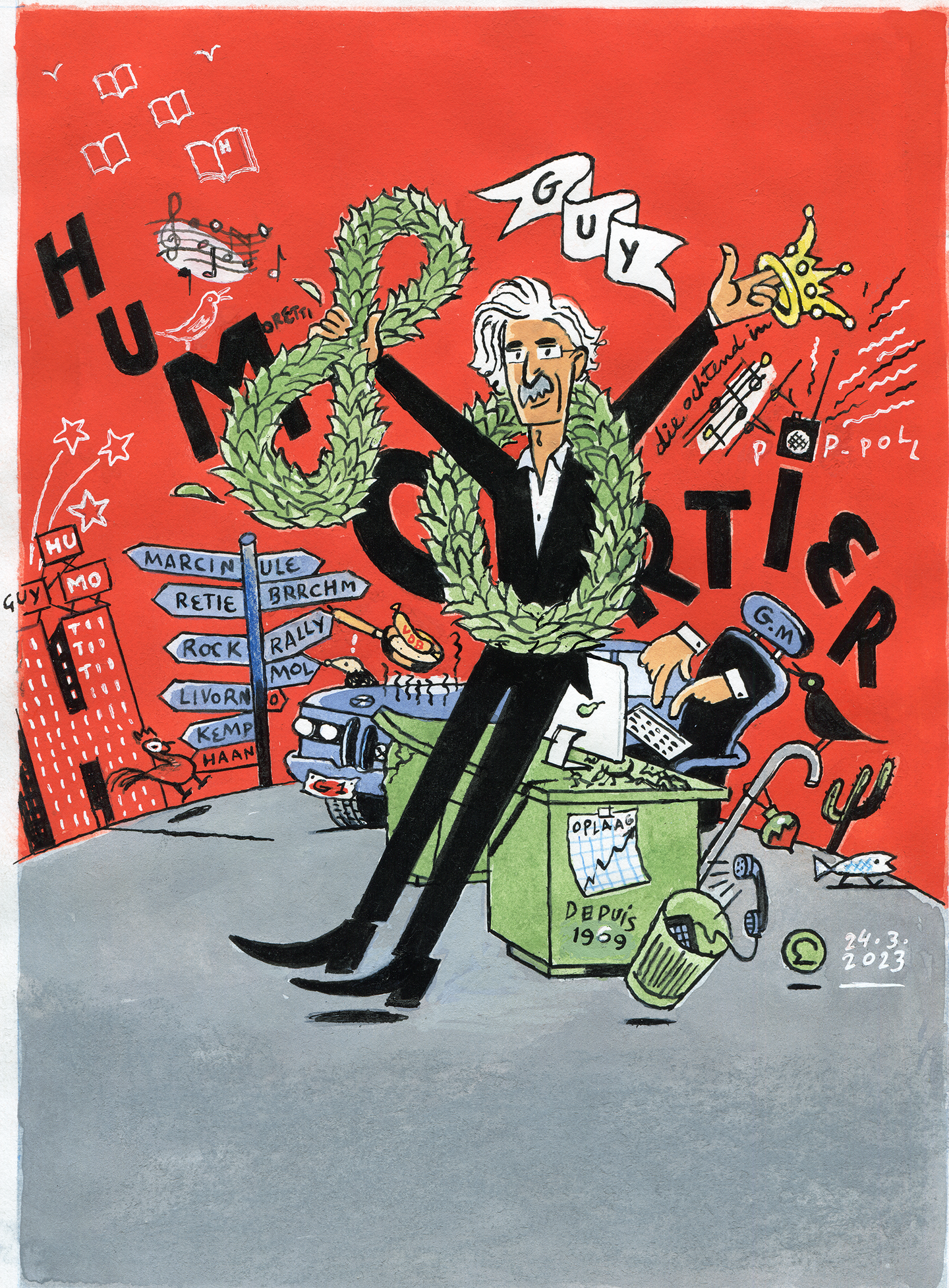MAGAZINES
‘work hard and don't give up!’
No other weekly in the Benelux is transforming into a digital media brand as swiftly as Humo. Editor-in-chief Bart Vanegeren sought out Guy Mortier, Humo’s grand old man, to congratulate him on his 80th birthday and collect some pearls of wisdom that will help secure Humo’s glorious future.
BART VANEGEREN / PHOTOS JOHAN JACOBS
Snapping his fingers and humming an early Elvis tune, Guy Mortier trots into his favourite pub, a short walk from his home on Antwerp’s Cogels-Osylei. He turns 80 at the end of March, but time has been kind to Humo’s patriarch, who published his first pieces in Humo when he was 18. In 1969, at the tender age of 25, he became editor-in-chief, a position he would hold for over 30 years, after which he stayed on as creative director. He’s still involved with the magazine as an adviser to this day. Sharp-minded and quick-witted, Mortier moulded Humo to his likeness for decades. And that winning combination of brains and banter is still on full display today, leading me to conclude that hard work must be good for your health.
GUY MORTIER «You’re looking for a segue, aren’t you? You’re going to ask me what the secret behind Humo’s success is, as if you don’t know the answer to that question yourself.” Guy Mortier smiles. “It’s hard work.”
»There was already a good foundation in place when I became editor-in-chief, so I was lucky. Humo had been the only TV magazine in Flanders for years, and even when that changed – the year I took over the reins, as it happened – Humo remained ‘the real deal’, and our TV section was unrivalled. That gave us the edge over our competitors, and it has always remained the backbone of the magazine. We also had pop music coverage already when I started. My main goal was really just to give everything an extra injection of quality, which I succeeded at, thanks also to lots of excellent young journalists who had just started. That’s the foundation we built Humo on. The only rule was that every piece we published had to be very well written – captivating, critical and if possible with a healthy dose of humour.»
Other countries also had TV guides. Why wasn’t our golden formula copied elsewhere?
MORTIER «Those magazines usually made the decision to only print the TV schedule, steering clear of any comment or criticism, presumably because they didn’t want to offend anyone so as not to hurt the record-breaking circulation numbers they were dreaming of.” He laughs. “That wasn’t something we gave much thought to at Humo. And that’s not how it works. We never tried to appeal to a broader audience to the point where we lost our identity. Humo was always clear about that: we offered a high level of quality for a wide audience, and we viewed our readers as intelligent people. This was exceptional at the time. Even the TV magazines published by public broadcasters in the Netherlands were so inoffensive and bland – with the exception of the VPRO Gids, which was made by like-minded people. But it’s always been difficult to explain what kind of magazine Humo is to people abroad. We used to just say something like, ‘a combination of Time Out and Rolling Stone, but different’.»
All in all, what are you most proud of?
MORTIER «That it became what it ended up becoming. That it worked so well. And that it still exists.
»For a very long time, we were able to reach an incredible number of people with something that was really good. For a few years, we sold an average of 240,000 copies a week, which means we must have had peaks of up to 270,000 or even 300,000. That’s an enormous circu-lation: each issue of Humo was read by four people on average, which means we reached a quarter of -Flemish people who could read. Those are huge -numbers, of course.»


‘Humo challenged the rest of the field and made its competitors sharper. And we definitely influenced entire generations of young journalists’
With numbers like that, there’s also the implicit understanding that you’re making a social impact. Was the goal to emancipate Flanders?
MORTIER «It certainly wasn’t our primary goal. Can you imagine? But you do inevitably influence your readers, even if it’s just through the way you formulate things, and you teach them – that was our hope, at least – to look at things critically and independently. We also wanted them to look at us like that, by the way. That was a mindset shared by everyone at Humo. Of course, we also employed some real baboons over the years – a list of names is available on request – but we always formed a close-knit team nonetheless: everyone shared a similar sense of justice and a critical outlook, everyone was pulling in the same direction. That was a great strength.»
Humo was founded in 1936 and has a weekly print circulation of almost 90,000.
That was only possible, of course, because the Its current editor-in-chief set the course and –
MORTIER «– relentlessly cracked the whip across the bloodied backs of his underlings?” Mortier laughs. “Well, someone has to. But in all seriousness, it is crucial to work together as one when you’re making a magazine. Because that’s something that shines through and becomes part of your image. And image is so important. So that’s something I put a lot of work into, with the cover, all sorts of promotions and clever stickers, and alliances with festivals like Torhout/Werchter, now Rock Werchter. We also had Humo’s Rock Rally, and we started making TV and radio ads as soon as we could. All to acquaint people with the essence and quality of Humo, through all possible channels.
»I think that’s also the biggest challenge today: making people aware of how good the magazine is. That hasn’t become any easier, because we’re now competing with the whole world, and because of how important images have become thanks to digitisation. But promotion is still key. It’s more crucial than ever.»

Ever Meulen's poster for 'the man of language', an event at the bourla in Antwerp in honour of Guy Mourtier's 80th birthday

“The only rule was that every piece we published had to be very well written – captivating, critical and if possible with a healthy dose of humour.” (Photo: Bart Vanegeren and Guy Mortier)
What else should Humo do to keep your life’s work vital?
MORTIER «Humo must be independent. An island on which editors have the freedom as well as the means to do what is necessary to keep the magazine unique. That also means going against the tendency of all those managing boards to organise companies in such a way that everyone has to do everything in the same way. Apparently, that’s some kind of irresistible temptation – it’s something that keeps rearing its head. But it must be avoided, or else it’s game over for Humo, I fear.
»Sales have declined, of course, but that’s also due to the reduced impact of TV – when we started, there were two channels and everyone was watching the same programme at the same time. And our competitors have started to catch up. During my early years at Humo, the other magazines and newspapers were a joke, but that’s changed. Perhaps Humo challenged the rest of the field and made its competitors sharper. And we definitely influenced entire generations of young journalists.
»The magazines we were sometimes compared to (Time Out, Rolling Stone, Les Inrockuptibles) no longer exist or have lost a lot of their lustre. Out of all those magazines, Humo is by far the most likely to have a long life. But maintaining our independence will be crucial. And we need lots of young people! Fortunately, I regularly see great pieces by new writers in Humo. And besides that: work hard and don’t give up!” He laughs. “And you need to be paid much better, of course. Here you should write: ‘The laughter has stopped. He is dead serious.’” The laughter continues.»
Finally, if in addition to being energetic, you were also young and enterprising, what kind of business would you start today?
MORTIER «The same one. But that wouldn’t be possible, of course. In any case, I would definitely learn to play a musical instrument. The piano! The guitar! And then you’d better run for cover.»
HUMO
Humo: the inability to be boring
‘I’m from Humo, so, from what was possible in those days / Dreams, protests and humour, which were all the same: / the inability to be boring.’ So wrote Herman de Coninck, poet and Humo editor from 1970 to 1983. He helped shape the magazine during its miracle years, which would transform Flanders. Guy Mortier, a maverick who as an 18-year-old had bluffed his way onto the first rock ’n’ roll show on Flemish radio, together with a band of like-minded talented young journalists, made Humo one of the strongest media brands in the Dutch language area.
Read more
HUMO
Humo: the inability to be boring
‘I’m from Humo, so, from what was possible in those days / Dreams, protests and humour, which were all the same: / the inability to be boring.’ So wrote Herman de Coninck, poet and Humo editor from 1970 to 1983. He helped shape the magazine during its miracle years, which would transform Flanders. Guy Mortier, a maverick who as an 18-year-old had bluffed his way onto the first rock ’n’ roll show on Flemish radio, together with a band of like-minded talented young journalists, made Humo one of the strongest media brands in the Dutch language area.
Ground-breaking journalism, hard work and having fun always went hand in hand at Humo. Mortier and his crew set a high bar for innovative pop journalism, television criticism, participatory reporting, columns, hard-hitting interviews and investigative journalism – all written with a dashing sense of style, plenty of humour, irreverence and a critical mindset.
When Mortier handed over the reins to Jörgen Oosterwaal after more than 30 years, Humo’s spirit and quality were preserved for another decade. After an interlude, Humo ended up at DPG Media, which brought Oosterwaal back to rebuild the magazine.
Now, seven years on, Humo is writing a digital story with its trademark panache and great results: in 2022, online growth doubled and total brand reach increased by more than 20 per cent. In 2023, Humo’s website is becoming a daily destination for more and more readers and subscribers, helping them decide what to watch and listen to – a safe haven for gripping journalism and an incorrigible purveyor of delicious nonsense. The cards are in Humo’s favour. Shortly before his death, superstar strategist Jan Callebaut, so competent that he managed to make the whole world believe that Heineken is actually refreshing, made his umpteenth cogent analysis: Humo’s outlook on life matches that of an adolescent in search of the best music and TV series as well as ways to make the world a better place, irreverent towards authority and with a penchant for sharp humour and a healthy sense of irony. The upcoming generation of digital natives is a natural match for Humo: dreams, protests and humour, and the inability to be boring.
BART VANEGEREN